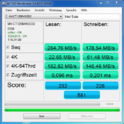- November 14, 2007
- 1,026
- 119
- Home Country
-
 Germany
Germany
Hey guys,
don't ask me why but I thought I would check my ssds performance. just to clarify: theres nothing wrong, everything is running fine and fast... but out of curiosity I would like to know what you think about the following results:
My htpc: ocz vertex 2 60GB, 43GB used, around 2 years old.

compared to a review in the net (ok, this is 120GB):

My pc: crucial m4 128GB, 20GB used, 8 month old.

compared to a review in the net:

Thoughts:
- Reviews are done with empty drives. Are SSDs significantly slower when some data is on them? (I know they need a certain amount of free space). Where's the critical point?
- I know I could have done the alignment and partitioning manually to have 1024k but does this explain a drop in performance? Can't believe that...
- The M4 is connected to a additional marvell chip not the onboard intel. I will have a look at that tonight...
- Benchmarks are bs either way...
What do you think?
Luca
don't ask me why but I thought I would check my ssds performance. just to clarify: theres nothing wrong, everything is running fine and fast... but out of curiosity I would like to know what you think about the following results:
My htpc: ocz vertex 2 60GB, 43GB used, around 2 years old.
compared to a review in the net (ok, this is 120GB):

My pc: crucial m4 128GB, 20GB used, 8 month old.
compared to a review in the net:

Thoughts:
- Reviews are done with empty drives. Are SSDs significantly slower when some data is on them? (I know they need a certain amount of free space). Where's the critical point?
- I know I could have done the alignment and partitioning manually to have 1024k but does this explain a drop in performance? Can't believe that...
- The M4 is connected to a additional marvell chip not the onboard intel. I will have a look at that tonight...
- Benchmarks are bs either way...
What do you think?
Luca










